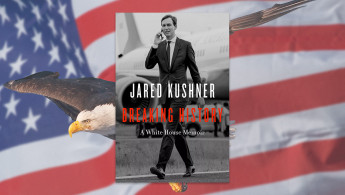Jared Kushner's illusory boasts in 'Breaking History' break all notion of reality
In time-honoured Washington fashion, the memoir of Jared Kushner, Donald Trump’s son-in-law, makes the case that its author was a pivotal, if hidden, force in American politics. Kushner has himself in the background of everything significant that occured in the four years Trump was in power.
He does this under the guise of modesty.
The book takes credit for everything, concedes nothing, and insists that Kushner is not only a business whiz, a political savant, and an all-round smart guy, but also that he is also an especially good dad and the dutiful husband of a distinguished and charming wife.
"When Kushner visits royal palaces and foreign opera houses, he normally remarks, not on the history or the atmosphere, but on the interior decoration"
The book deals with policy, domestic and foreign, over all of which Kushner claims to have had immense influence.
But the thing of which he is most proud is his handling of the Middle East.
Kushner sincerely believes that he and Trump brought peace to the region, and happily lists all the times people told him so. He is especially proud of a Kushner Garden of Peace, planted in Jerusalem in his name to commemorate that effect.
There are problems with this perspective, of course – not least the fact that the Middle East as a whole is not suffering an abundance of peace, nor has at any time in the past six years since Trump and Kushner came to power.
With repeated fighting in Gaza, the wars in Syria and Yemen continuing to claim thousands of lives per year, civil discord in Iraq and Lebanon, Libya still in pieces, and the threat of renewed ISIS terrorism hanging over all – one is tempted to ask what, precisely, Kushner considers peace to mean, or to look like.
|
As it happens, he defines it himself. Namely, sidestepping Palestinian people, and their leaders, and handing Israel very much of what it wants, in a bid to facilitate improvement in the bilateral relationships between Israel and Arab states.
Part of this book is a kind of bildungsroman, a story of the challenges encountered by a novice.
Kushner is continually surprised by obvious things. That communist China claims it is an old society, for example, whose leaders play the long game. (This is now so widely remarked-upon that it has transcended common knowledge to become a falsity and a cliché.) He is surprised to see people dancing with swords in Saudi Arabia.
Kushner’s observations of foreign leaders are banal and the understanding he claims to have gleaned from his many thousands of miles of travel are sparse. When Kushner visits royal palaces and foreign opera houses, he normally remarks, not on the history or the atmosphere, but on the interior decoration.
The author has an irritating faux-naïve style, which may be necessary to attract wide readership, but which also makes him seem ignorant of essential things.
He feels the need to dramatize conversations with foreign leaders and with White House colleagues in pursuit of clear narrative. In doing so, it often appears that his mind is made up by someone stating – in the most wide-eyed way – something Kushner could have read, or should already have known.
He seems to believe that when Trump spoke with Xi Jinping of China and Recip Tayyip Erdogan of Turkey, these leaders weren’t enacting a pose – motivated by personal factors mixed with their conceptions of national and political interest.
"In Palestine, these deals were abstract and distant. They did not decrease the frequency or ferocity of fighting between Israel and Hamas, or Israel and Islamic Jihad – as the last month has seen. They didn’t bring Gazans greater political or civil rights"
Rather than praising Trump and claiming to be his pal for diplomatic reasons, Kushner implies, they really thought he was great, and saw him as a personal friend. Kushner appears to have more faith in the power of Trump’s personality than Trump did.
Kushner also claims total faith in the reforms of Mohammad bin Salman, the crown prince of Saudi Arabia – and never concedes for a moment that MbS may have ordered the murder of Jamal Khashoggi, which has changed almost every other American policymaker’s attitude to the crown prince.
MbS tells Kushner that the killing happened on his watch, so he bears vague ultimate responsibility (in the same way, if I were to make an analogy, that a CEO might if some rogue employees committed fraud on company stationery). And Kushner believes him.
|
Kushner also believes Xi Jinping when Xi tells Trump that he had little influence over North Korea, because he did not know Kim Jong-un very well personally. Madness.
This ingenue style is perhaps necessary when claiming two things, as Kushner does: that his peace plan broke new ground, and that it only did so by reassessing old certainties and approaching things from a fresh perspective.
A fresh perspective can be built on hard thinking or it can be built on bafflement and ignorance. Kushner depicts himself as baffled and ignorant.
Kushner sees the normalisations between Israel and Arab states which occurred – the ‘Abraham Accords’ – as a triumph and a moment of pathbreaking significance.
This is true in a small way. Arab leaders were successful in going above Palestinian leaders – Mahmoud Abbas in particular, whom Kushner depicts as old, tired, petty and personally corrupt – to reach their own deals with Israel.
Normalisation meant commercial relationships between Israel and its Arab neighbours. It meant mutual enrichment; and American recognition of Jerusalem as Israel’s capital and Israeli sovereignty over the Golan Heights.
The Arab leaders got to make deals with Israel on their own terms, with the fig leaf of securing agreements for believers to access the Al-Asqa mosque.
In Palestine, these deals were abstract and distant. They did not decrease the frequency or ferocity of fighting between Israel and Hamas, or Israel and Islamic Jihad – as the last month has seen. They didn’t bring Gazans greater political or civil rights. They kicked even the language of a two-state solution further down the road, far beyond Kushner’s responsibility.
Kushner’s great achievement in his Israeli—Palestinian peace plan is the same way that a deal between French and British leaders on what to do about border arrangements in Calais would represent an advance in the Northern Ireland peace process. In other words, it is no such thing. At best, the one is tangential to the other. But don’t worry – he is very proud of himself, nonetheless.
James Snell is a writer whose work has appeared in numerous international publications including The Telegraph, Prospect, National Review, NOW News, Middle East Eye and History Today.
Follow him on Twitter: @James_P_Snell



